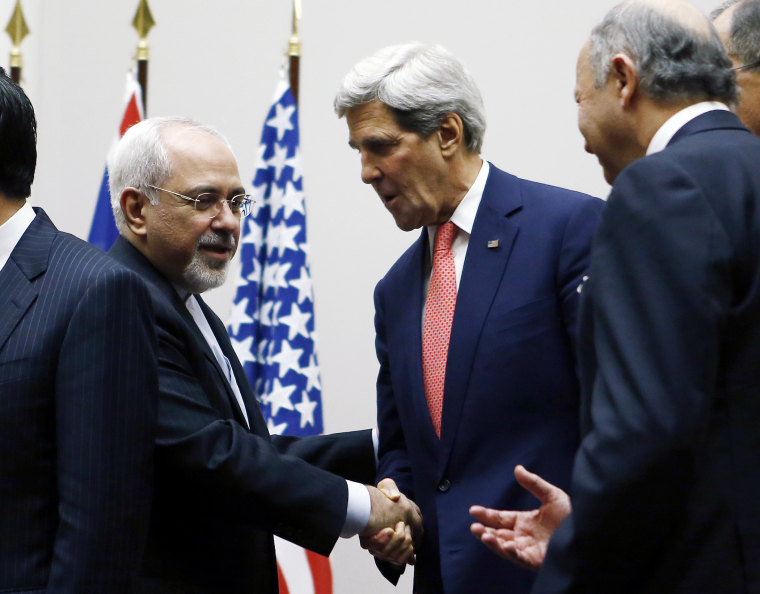No one knows if the Obama administration will manage in the next five weeks to strike what many in the White House consider the most important foreign policy deal of his presidency: an accord with Iran that would forestall its ability to make a nuclear weapon. But the White House has made one significant decision: If agreement is reached, President Obama will do everything in his power to avoid letting Congress vote on it. Even while negotiators argue over the number of centrifuges Iran would be allowed to spin and where inspectors could roam, the Iranians have signaled that they would accept, at least temporarily, a "suspension" of the stringent sanctions that have drastically cut their oil revenues and terminated their banking relationships with the West, according to American and Iranian officials. The Treasury Department, in a detailed study it declined to make public, has concluded Mr. Obama has the authority to suspend the vast majority of those sanctions without seeking a vote by Congress, officials say.
Obama looks to steer clear of Congress on Iran deal
The system isn't supposed to work this way. Then again, the system is supposed to have a functioning legislative branch led by responsible lawmakers.

Just last week, Iranian President Hassan Rouhani said that a nuclear deal with the West is likely. According to Iranian broadcaster Press TV, Rouhani told his constituents, "We will find a solution to the nuclear subject and we believe that the two sides will certainly reach a win-win agreement."
Obama administration officials have been far more circumspect when it comes to setting expectations for the nuclear talks, but most accounts suggest there's reason for cautious optimism -- at a minimum, the negotiations appear to be moving in the right direction.
But there is a complication: any deal that requires Congress to govern in any meaningful way should necessarily be considered suspect. The White House knows this all too well, and David Sanger reports today that officials are acting accordingly.
And for the administration, that would at least move the process forward. That said, Sanger notes that Congress has approved sanctions that would remain in place without additional action from lawmakers -- action that seems impossible, at least for now.
Negotiators realize this, and hope to work into the deal a lengthy process that would delay the need for legislation for years.
If this dynamic sounds familiar, there's a good reason for that.
A couple of months ago, there were reports that Obama administration officials are also working with international partners on a climate agreement, taking special care to create a framework that would not need congressional support because it's no longer possible for the Senate to approve treaties.
For Republicans, such end-runs are further proof that Obama is an out-of-control tyrant. But for the White House, the concerns are entirely practical: the president doesn't want to bypass the legislative branch, but he no longer has much of a choice given what's become of the American legislative process since January 2011.
The underlying issue -- on Iran, on climate, on practically every policy challenge under the sun -- is what becomes of policymaking in the United States when Congress can no longer function as a governing institution.
For GOP lawmakers, the answer seems to be a curious expectation: if Congress can't pass laws, then American policymaking must cease to be. But in the real world, this is untenable, whether Capitol Hill likes it or not -- policymaking often has its own momentum, driven by needs and circumstances. When it hits a choke point in the halls of Congress, it doesn't always die so much as it moves.
Congress can't pass a minimum-wage increase? The issue moves to the states and private sector. Congress won't pass immigration reform? The issue moves to the realm of executive action and prosecutorial discretion. Congress can't consider issues of foreign policy? The issue forces international negotiators to design agreements that lawmakers can't screw up.
The system isn't supposed to work this way. Then again, the system is supposed to have a functioning legislative branch led by responsible lawmakers.